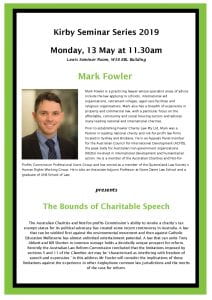Kirby Seminar Series 2018
Monday 13 May 2019, 11.30am
Lewis Seminar Room, W38 EBL Building
The Hon Dr Gary Johns
Commissioner – Australian Charities & Not-for-profits Commissions
The Hon Dr Gary John took up the role of Commissioner following a long and varied career in public service and policy advice, including as the author of eight books on public policy. He was an inaugural board member of Volunteers Australia, a member of the Prime Minister’s Business Community partnership, and the committee to design the Redress Scheme for survivors of institutional child sex abuse.
Gary was a member of the House of Representatives from 19871996 and served variously as Parliamentary Secretary to the Deputy Prime Minister, Parliamentary Secretary to the Treasurer, and Special Minister of State and Assistant Minister for Industrial Relations. He served as an Associate Commissioner of the Associate Commissioner of the Commonwealth Productivity Commission 2002-2004. He received the Centenary Medal in 2001 and the Fulbright Professional Award in Australian-United States Alliance Studies in 2002, which was served at Georgetown University, Washington DC.
He was Senior Fellow at the Institute of Public Affairs, senior consultant with ACIL Tasman, Associate Professor, Australian Catholic University, and Visiting Fellow at QUT Business School.
presents
ACNC strategy: a more visible charity market
There exists a market in charitable intentions that involves exchanges between donors (funders) and charities (representing beneficiaries). Information and trust are vital in these exchanges. The Australian Charities and Not-for-profits Commission collects important information about the 57,000 charities registered with it. The Commission is exploring how this data could be made publicly available in a way that would create a more informed market, leading to a better functioning charity market and enhanced discussion about the sector’s performance. To this end, the Commission has embarked on two data projects. The first is the ‘Program Marketplace’ project, the aim of which is to enable users of the ACNC Register to search for comparable charity programs provided for specific beneficiaries, in specific locations. The second project aims to enable the Commissioner to publish a regular series of statistics that provide a measure of the positive attributes referred to in the second object of the ACNC Act, that is: the extent to which the charity sector is robust, vibrant, independent and innovative
and
Mark Fowler
Mark Fowler is a practicing lawyer whose specialist areas of advice include the law applying to schools, international aid organisations, retirement villages, aged care facilities and religious organisations. Mark also has a breadth of experience in property and commercial law, with a particular focus on the affordable, community and social housing sectors and advises many leading national and international charities.
Prior to establishing Fowler Charity Law Pty Ltd, Mark was a Partner in leading national charity and not-for-profit law firms located in Sydney and Brisbane. He is an Appeals Panel member for the Australian Council for International Development (ACFID), the peak body for Australian non-government organisations (NGOs) involved in international development and humanitarian action. He is a member of the Australian Charities and Not-for-Profits Commission Professional Users Group and has served as a member of the Queensland Law Society’s Human Rights Working Group. He is also an Associate Adjunct Professor at Notre Dame Law School and a graduate of UNE School of Law.
presents
The Bounds of Charitable Speech
The Australian Charities and Not-for-profits Commission’s ability to revoke a charity’s tax exempt status for its political advocacy has created some recent controversy in Australia. A law that can be wielded first against the environmental movement and then against Catholic Education Melbourne has almost unlimited entertainment potential. A law that can unite Tony Abbott and Bill Shorten in common outrage holds a decidedly unique prospect for reform. Recently the Australian Law Reform Commission concluded that the limitations imposed by sections 5 and 11 of the Charities Act may be ‘characterised as interfering with freedom of speech and expression.’ In this address Mr Fowler will consider the implications of these limitations against the experience in other Anglophone common law jurisdictions and the merits of the case for reform





